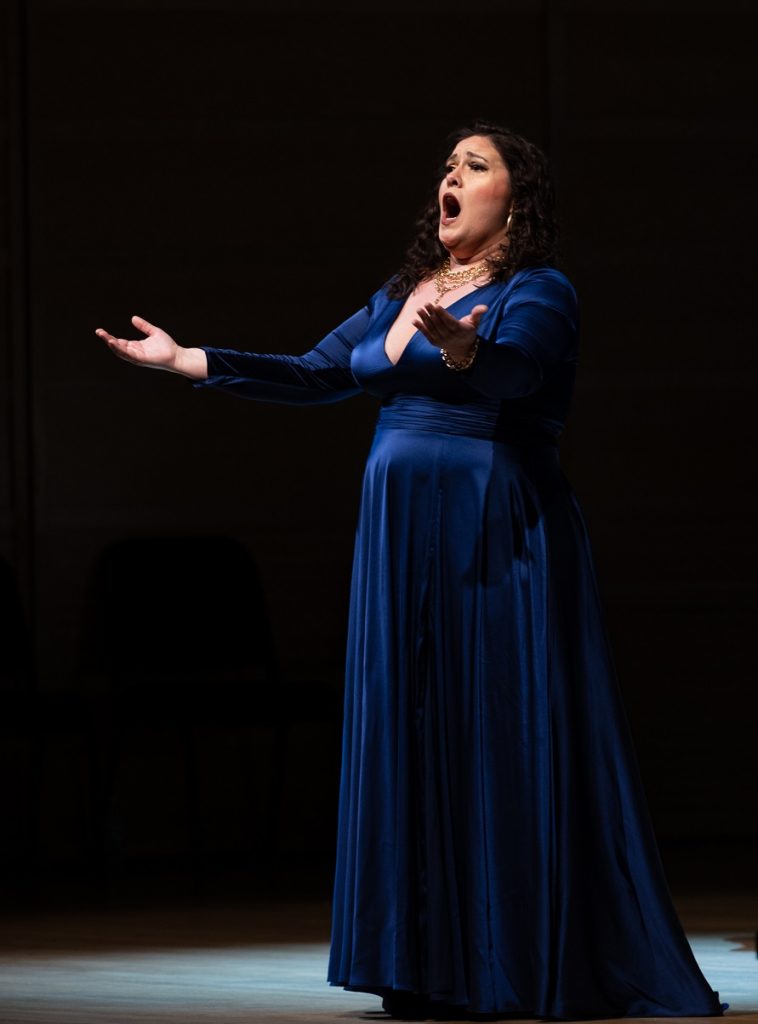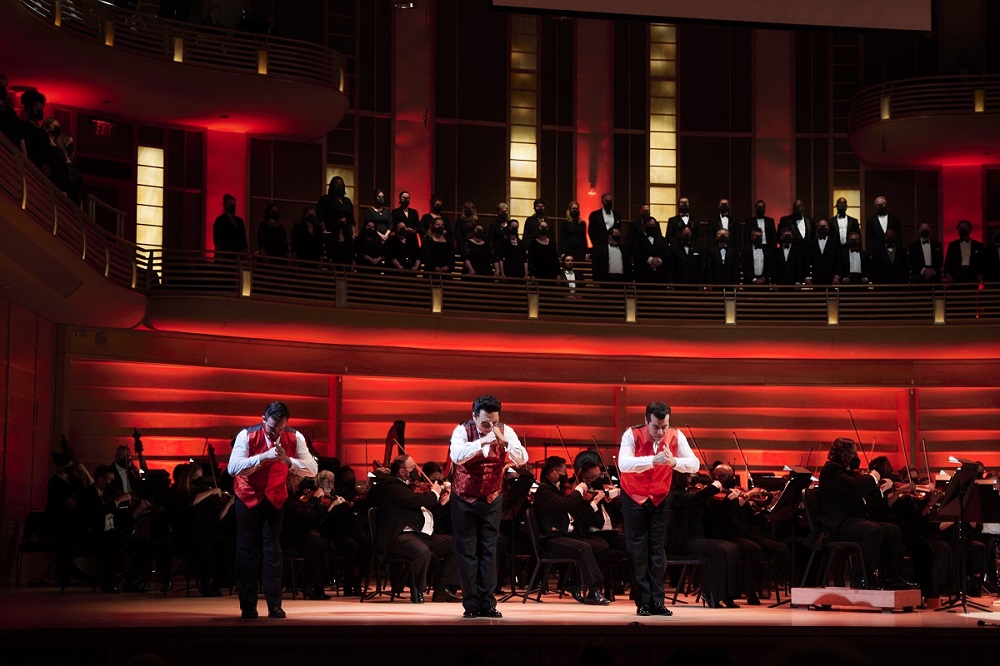Maryland Lyric Opera returns to live performance with roof-raising Puccini

Alexandra LoBianco sang the role of Turandot Friday night with Maryland Lyric Opera in the Music Center at Strathmore. (Photo: Julian Thomas)
Maryland Lyric Opera rose from the pandemic ashes in splendid form on Friday night. In the young company’s first live performance since February of 2020, an excellent cast gave an expansive concert rendition of Puccini’s Turandot in the Music Center at Strathmore. Music director Louis Salemno presided over the oceanic sound of a large orchestra and chorus that filled the hall to thrilling effect.
Soprano Alexandra LoBianco opened her Act II showpiece, “In questa reggia,” with a smooth, subtle tone. This more introspective vocal approach evened out the icy cruelness often heard in the role, adding a note of sympathy to an often unsympathetic character. At the same time, LoBianco showed she could ascend to the scene’s high Bs with blistering accuracy and force.
A minor gaffe with an entrance in the orchestra during the first part of the riddle scene did not shake LoBianco either, an awkward moment soon righted by Salemno. LoBianco’s willingness to explore the softer side of the role paid off in the unsatisfactory ending of the opera, heard in the version made by Franco Alfano for the opera’s 1926 premiere, two years after Puccini’s death. The character’s earlier vulnerability made the sudden blossoming of her love for Calaf a little more believable.
Tenor Jonathan Burton brought heroic power to the role of the unnamed prince, later revealed as Calaf. His voice could not slice through the amassed power of the orchestra and chorus as easily as LoBianco, although Salemno often brought down the instrumental volume with vigorous shaking of his left hand. At the critical solo moments, however, his top notes rang with authority and beauty, especially in the opera’s most famous aria, “Nessun dorma” in Act III.
Nicole Heaston’s velvety soprano suited the role of Liù ideally, with floating high notes in “Signore ascolta” in the first act. The delicacy of her sound, sometimes easily covered in ensemble scenes, made the character’s innocent devotion to Calaf, who scorns her, all the more poignant. Her top range shimmered with tragic pathos in the scene of her torture and death in the third act.
Bass Morris Robinson thundered with indignation as Calaf’s long-lost father, the dethroned Tartar king Timur, a role he was reprising from the last local Turandot, with Washington National Opera in 2009. Baritone Javier Arrey excelled as Ping, the leader of the trio of overworked palace ministers, with a nostalgic turn in “Ho una casa nell’Honan” in Act II. Tenors Joseph Michael Brent and Yi Li added further comic relief as Pang and Pong.
Hunter Enoch’s stalwart bass-baritone resonated from both the stage and from the upper balcony over the stage in the pronouncements of the Mandarin. Tenor Mauricio Miranda was aptly timorous as the aged Emperor Altoum, doubling as the Prince of Persia, who loses his head trying to gain the hand of Turandot.

(L to R) Joseph Michael Brent, Yi Li, and Javier Arrey (Pang, Pong, and Ping) in Maryland Lyric Opera’s Turandot at Strathmore (Photo: Jahns Chavez)
While the region’s opera lovers had the chance to hear grand opera again last fall, from Washington Concert Opera, this performance was the first opera since the start of the pandemic to feature a full orchestra and an immense chorus. The latter, prepared by Steven Gathman, produced a broad range of dynamics from their place in the first balcony over the stage. Singing from memory, these 78 singers followed Salemno’s gestures with flawless precision and ensemble unity.
The noisy crowd scenes are some of Turandot‘s most memorable moments, especially with the wall of vocal sound produced by this full-throated ensemble. Softer scenes were just as memorable, like the mysterious moonrise in Act I, in which moody blue lighting (designed by Stuart Duke) matched misty vocal color. A few women of the chorus also served admirably as the children’s chorus, singing the Chinese folk song “Mo Li Hua,” which Puccini used as a leitmotif associated with Turandot.
Salemno fielded almost the complete orchestration for the opera, including the two alto saxophones added somewhat extravagantly by Puccini. The banda, instruments specified in the score as playing on stage, sat in the high second balcony over the stage. Associate Conductor Husan Park helped guide them in brilliant antiphonal effects with the vast orchestral forces below them.
A team of five percussionists marshaled the vast battery, including Chinese gongs. Salemno’s clear beat and careful management of balances served the singers well, but the most thrilling moments were the fortissimo climaxes, a magnificent clamor. Stage director David Gately used the remaining portions of the upper balconies over the stage to create a sense of staging, placing characters there in dramatic spotlights at crucial moments.
Turandot will be repeated 2 p.m. Sunday in the Music Center at Strathmore. mdlo.org
